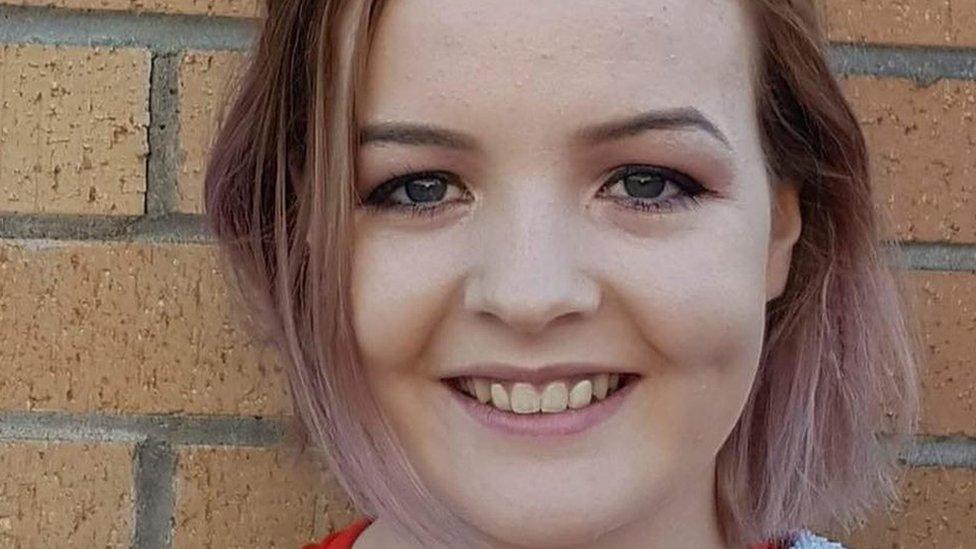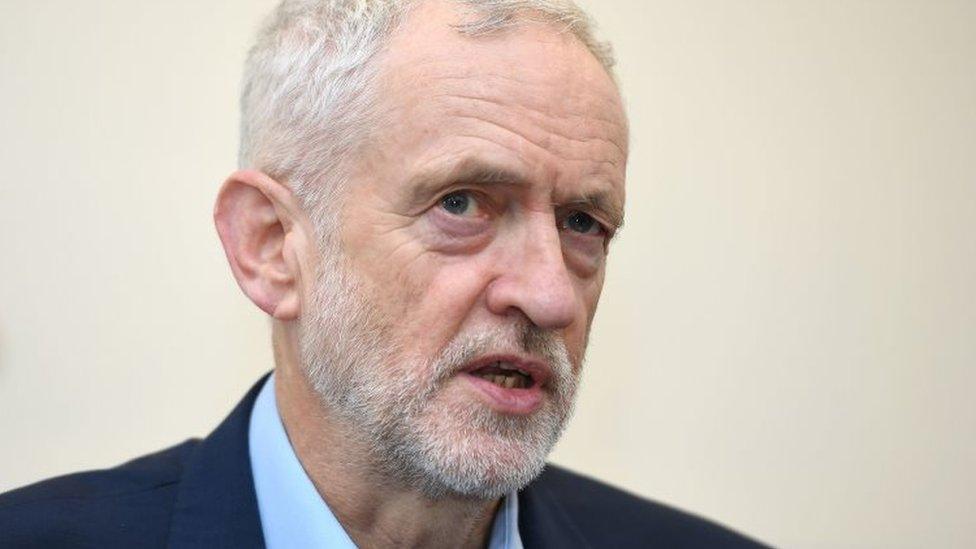Labour pledges £10 minimum wage for under-18s
- Published
Jeremy Corbyn: "We will abolish the youth rate of the minimum wage"
Labour will extend its plans for a higher £10-an-hour minimum wage to include workers under the age of 18, party leader Jeremy Corbyn has said.
Currently, under-18s are entitled to a minimum wage of £4.35 per hour, compared with £8.21 for over-25s.
But under a Labour government this "youth rate" for the minimum wage would be ended in 2020, Mr Corbyn said.
One business group said there was value in having the minimum wage set by an independent group, as it is now.
Mr Corbyn had already pledged to raise the National Living Wage - a legally binding hourly rate for workers aged 25 and over - to £10 an hour next year, if Labour gained power.
He said Labour's proposal would see workers aged 16 and 17 paid about £2,500 more a year.

Mr Corbyn said that young people's work "should be properly valued"
It is not clear how the proposed changes would impact those on apprenticeship schemes.
All UK pupils can leave school at the age of 16.
But in England, under-18s must then stay in full-time education, start an apprenticeship or traineeship or spend 20 hours or more a week working or volunteering, while in part-time education or training.
Speaking at a party gathering in Birmingham on Saturday, Mr Corbyn said: "Equal pay for equal work is hardly a controversial idea, so why are we discriminating against young people?
"You don't get a discount at the shops for being under 18.
"But if the person serving you on the other side of the counter is young, they could be on half the wage of their colleagues.
"It's time to end this discrimination. Young people's work should be properly valued, not exploited by employers to cut their wage bill. If they're doing the job, pay them the wage - the real living wage."
The rates are reviewed each year by the government which is advised by the independent Low Pay Commission.
The commission, made up of trade unionists, businesspeople and academics, has previously said different minimum wages have been set for different age groups due to "evidence that younger workers are more at risk of being priced out of jobs than older workers, with worse consequences if they end up unemployed."

Minimum wage rates from April 2019
25 and over: £8.21
21-24: £7.70
18-20: £6.15
Under-18: £4.35
Apprentice: £3.90

Paul Johnson, director of the Institute for Fiscal Studies, said the proposals were "dramatic" and that they could risk reducing the number of 16 and 17-year-olds in work.
That age group would not have much experience and were probably not going to be as productive as more experienced workers, he told Radio 4's Today programme.
He added that a lot would be working part time - at the weekends or in the holidays - and that experience would be valuable to them and could include training.
Labour said it would use fiscal savings from a reduction in the amount that the Treasury pays out in in-work benefits to provide support for small and medium-sized businesses.
Peter Dowd, shadow chief secretary to the Treasury, said the plans aimed to create fairness, claiming that spending on tax credits to top up low wages had "ballooned" from £1bn to £30bn - a sign wages had to rise.
"We've got to have a system that reflects the needs of small businesses, but also has to reflect the needs of the people they employ, whether they are 16 or 60," he said.
Mr Johnson added that any compensation scheme would "need to be very clear, transparent and easy."
Responding to Labour's proposals, the Institute of Directors said there was value in having an independent, evidence-based approach from the Low Pay Commission.
"Politicians directly setting rates will always risk not taking full account of the implications for employers and jobs," the business lobby group said.

The UK's working 16-17 year olds in numbers
There were an estimated 1.35 million 16 to 17-year-olds in the UK at the end of last year
Of those, 6% (81,000) were solely in employment
5% (71,000) were neither in work nor education
For those not in full-time education, the employment rate of this group has fallen from 65% in 1993 to 44% in 2018

Are younger workers worth £10 an hour?
The young worker

Student Neha Gohil began her first job as a tutor in Ealing, west London, aged 16.
She says that it "didn't seem fair" when she learned she was paid less than her older colleagues.
Now 20 and a student at the University of Warwick, she says younger workers can be "more flexible with their time and can offer a different dynamic".
"They can offer something different in the workplace: be more creative, more innovative. They might know how to do things with technology that someone who's older might not.
"They can go into a company and offer fresh ideas."
The business owner
Businessman Jack Palmer, 27, who owns and runs three hairdressing salons in Hertfordshire said he "can't see it being affordable".
He employs between 12 to 15 people aged 18 to 25. But, he says, if the £10 minimum wage was brought in for all, he might only be able to afford to employ half of them.
"If you've got someone coming straight out of school their skill set is pretty minimal to begin with.
"Of course, they learn on the job and through external training - and it gives us a lot of pleasure nurturing that talent.
"They'll get the opportunity to earn a high wage but to begin with, they're not worth that amount," he added.

Matthew Percival, head of employment at the Confederation of British Industry, said: "The minimum wage is an important part of the UK labour market and must not be used as a political football.
"Youth rates play an important role in helping to reduce youth unemployment and should be retained."
Chris Philp MP, Conservative vice-chairman for policy, said: "Under the Conservatives, we have seen youth unemployment fall by half, the biggest increase in the minimum wage for under-25s in a decade and the economy continue to grow, giving young people the security of a better future."
- Published1 April 2019

- Published18 April 2018

- Published7 February 2019

- Published29 March 2019

- Published1 October 2019
